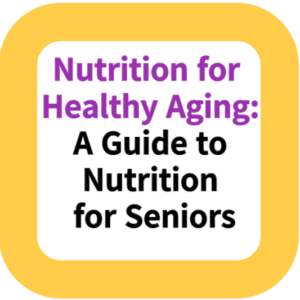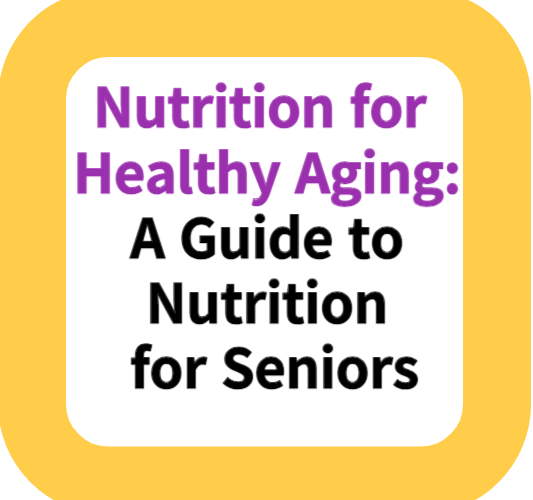Nutrition for Healthy Aging: A Guide to Nutrition for Seniors
Welcome to our blog, where we delve into the essential topic of nutrition for seniors. In this space, we explore the significance of a balanced and nutrient-rich diet, tailored to meet the unique needs of older adults. Our focus is on providing comprehensive information about incorporating a variety of fruits and vegetables, lean proteins, whole grains, and low-fat dairy into daily meals.
We also emphasize the importance of healthy fats, hydration, and, when necessary, the appropriate use of vitamin and mineral supplements. Our goal is to offer insights and practical tips to help seniors maintain optimal health, strength, and well-being through thoughtful and informed dietary choices.
Join us as we navigate the journey of healthy aging, ensuring that every meal contributes to a life full of vitality and wellness.
Nutrition for Healthy Aging: A Guide to Nutrition for Seniors

Introduction: The Importance of a Nutrient-Dense Diet for Seniors
As individuals age, the importance of maintaining a healthy and balanced diet becomes paramount for ensuring overall health and well-being. For seniors, this is particularly critical due to their unique nutritional needs and the body’s changing dynamics.
A diet rich in nutrient-dense foods provides the necessary vitamins, minerals, and fiber to maintain optimal health, and plays a crucial role in combating age-related challenges.
Fruits and Vegetables: A Rainbow of Nutrients
Fruits and vegetables are cornerstones of a healthy diet, especially for seniors. They are packed with essential vitamins, minerals, fiber, and antioxidants. Consuming a diverse array of colorful fruits and vegetables ensures a broad spectrum of nutrients.
Leafy greens like spinach and kale are rich in vitamins K and A, while berries and citrus fruits provide vital antioxidants. Root vegetables like carrots and sweet potatoes offer fiber and essential vitamins.
Lean Protein: Building and Maintaining Muscle
Protein is vital for maintaining muscle mass and strength, which can decline with age. Seniors benefit from incorporating lean protein sources into their diet, such as poultry, fish, beans, and legumes.
These foods provide essential amino acids without excessive fat. Skinless chicken, turkey, and fish like salmon and tuna are excellent choices, offering both protein and other nutrients like omega-3 fatty acids.
Whole Grains: Fiber and Energy
Whole grains are an excellent source of energy, fiber, and essential nutrients for seniors. Foods like oats, brown rice, quinoa, and whole-grain breads offer complex carbohydrates that help stabilize blood sugar levels and improve digestive health. These grains also contribute to a feeling of fullness, helping to maintain a healthy weight.
Low-fat Dairy and Alternatives: Essential for Bone Health
Dairy products are a key source of calcium and vitamin D, which are crucial for maintaining bone health. Low-fat options like milk, yogurt, and cheese are recommended to minimize saturated fat intake. For those who prefer non-dairy alternatives, fortified soy milk and almond milk are excellent options, providing similar nutritional benefits.
Nuts and Seeds: Nutrient-Packed Snacks
Nuts and seeds are small but mighty sources of nutrients. They offer healthy fats, protein, and fiber, making them an ideal snack for seniors. Options like almonds, walnuts, chia seeds, and flaxseeds are not only nutritious but also contribute to heart health and cognitive function.
Fish: A Source of Omega-3 Fatty Acids
Fish is particularly beneficial for seniors due to its high omega-3 fatty acid content, which is known to reduce inflammation and support heart and joint health. Incorporating fish like salmon, mackerel, and sardines into the diet can provide these essential fats, which are crucial for overall health.
Healthy Fats: Supporting Brain and Overall Health
Healthy fats are essential for maintaining good health, particularly in seniors. They support brain function, nutrient absorption, and overall well-being. Foods rich in healthy fats include avocados, olive oil, and fatty fish. These fats are not only nutritious but also help in the absorption of fat-soluble vitamins.
Hydration: A Key Aspect of Senior Health
Proper hydration is often overlooked but is crucial for seniors. Aging can reduce the body’s ability to signal thirst, so it’s important to encourage regular water intake. Including hydrating foods like soups, smoothies, and fruits with high water content, such as watermelon and cucumbers, can also aid in maintaining hydration levels.
Vitamin and Mineral Supplements: Tailoring to Individual Needs
While a balanced diet is the best way to obtain necessary nutrients, some seniors may require additional vitamin and mineral supplements. Consulting with healthcare professionals is essential to determine if supplements are needed and to ensure they are taken safely and effectively.
Conclusion: A Comprehensive Approach to Nutrition for Seniors
In conclusion, a well-rounded and nutrient-dense diet is vital for seniors to maintain optimal health. This diet should include a balanced mix of fruits and vegetables, lean proteins, whole grains, low-fat dairy or alternatives, nuts, seeds, and fish, complemented with healthy fats.
Regular hydration and, if necessary, dietary supplements tailored to individual needs are also important components. Consulting with healthcare professionals for personalized dietary plans is recommended to address specific dietary restrictions and health conditions. This holistic approach to nutrition can significantly enhance the quality of life and health outcomes for seniors.
